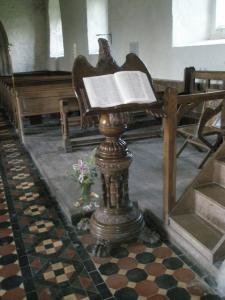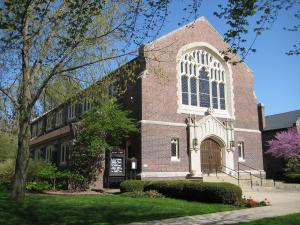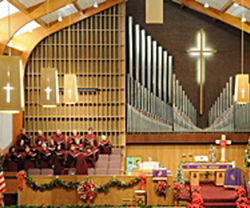 As I have stated before in these columns, I was not raised in the church, though I did go a time or two after moving to Phoenix in 1953 from a very cold Indiana. My parents went quite regularly before we moved, but after attending only a few Sundays a Disciples of Christ congregation, my father, who was a heavy smoker, became enraged when the minister of the church in his sermon equated smoking with suicide. We left that day and did not return. Church can be a confrontational place I learned that day. And since I was anxious that my father quit smoking (he never did until a cancer diagnosis many years later), I secretly was glad that someone had publically said what I had privately hoped, even as a very young person. Church had a purpose.
As I have stated before in these columns, I was not raised in the church, though I did go a time or two after moving to Phoenix in 1953 from a very cold Indiana. My parents went quite regularly before we moved, but after attending only a few Sundays a Disciples of Christ congregation, my father, who was a heavy smoker, became enraged when the minister of the church in his sermon equated smoking with suicide. We left that day and did not return. Church can be a confrontational place I learned that day. And since I was anxious that my father quit smoking (he never did until a cancer diagnosis many years later), I secretly was glad that someone had publically said what I had privately hoped, even as a very young person. Church had a purpose.
Nearly all denominations, even our colleagues among the Southern Baptists, are experiencing trying times. Seminaries are surviving by joining themselves to other academic institutions. Two have occurred just this year in the state I now call home. Claremont School of Theology, long housed in the city that its name bears, is moving its entire operation to Willamette University in Oregon, and San Francisco Theological Seminary is becoming a part of the University of Redlands, although they will retain their lovely campus in Marin County. These are signs that the wider church is hemorrhaging members at a rapid and increasing rate, causing its credentialing institutions to seek creative ways to maintain viability. As churches decline, fewer persons seek leadership in that church, which leads to fewer students in the denomination’s schools. My own denomination, United Methodism, has lost fully 40% of its US membership in the 50 years of my ordination. Presbyterians, Disciples, United Church of Christ, Episcopalians have similar losses.
The large question is: why? How many books, articles, workshops, studies, bull sessions have attempted to answer that question? Of course, any answer is vastly complex, including the huge social changes that the society continues to undergo. We all know that 25% of the adult US population now classifies themselves as “nones,” no religious affiliation, a figure that has perhaps doubled in the past 10 years. Clearly, the church is now barely an afterthought among many of our citizens. As it has been said, once the preacher could no longer threaten the flock with hellfire if they did not faithfully attend services, or promise heavenly bliss if they did, many found little reason to show up. That is only partly facetious, I think. Obviously, many reasons may be presented to demonstrate why the church is in such trouble.
Today, I want to suggest that old 8th century BCE Amos has one answer that should not be avoided. In fact, I might go so far as to say that his answer to the question may be the most important one we church types face. It is found in the 8th chapter of his little book from 2700 years, or so, ago. He first describes the Israel he sees:
“Hear this, you that trample on the needy, who ruin the poor of the land,
saying, ‘When will the new moon be over, so that we may sell grain;
When will the Sabbath end,
so that we may offer wheat for sale?
We will make the ephah small and the shekel great,
and practice deceit with false scales, buying the poor for silver,
and the needy for a pair of sandals,
selling the leavings of the wheat.’”
Amos here portrays in quite unforgettable poetry a picture of an Israel that is mad for business, for making money at any cost, including cheating all customers, and then using the ill-gotten money for the buying and selling of human beings, presumably into chattel slavery, all the better to increase their illegal activities. Church, for these evil men, is no more than a wretched distraction from the business of gaining wealth, a time of the week that stops their deceitful business actions, making them anxious for the choir to cease their interminable tunes and for the preacher to cut the message short. After all, there is money to be made, more people to defraud, more slaves to be bought and sold.
I am not suggesting, nor do I think Amos is implying, that all business is automatically evil. The issue for Amos, and for me, is the content of those worship services; just what are the people hearing from their priest or minister? Does that religious leader ever venture a word of challenge for those whispering business moguls, sitting in the back pew, demanding that they use honest scales only in their wheat business, that they sell only the best wheat to their buyers, that they refrain from the purchase and sale of poor people whose only hope is to be given a means for survival beyond the sale of their own bodies? By saying this, of course, Amos implies that the high priest Amaziah has not said anything like this, but is perhaps in cahoots with these very businessmen, and with the king of the land, Jereboam, to continue things in Israel as they are. The businessmen, the priest, and the king are comfortable in their power and need no one to meddle in their affairs, especially no southern outsider like Amos to tell them what to do.
And right here I think we can see what Amos may be saying to our 21st century church. People do not leave the church in such numbers because the band is not good enough, because the lighting is not distinctive, because the choir is subpar, because the organ is too loud, because the programs do not meet the needs of the people. To be sure, any of these reasons, among others that you can name, are reasons for some to leave. But these are not the basic reasons, the bedrock rationale for the irrelevance of the contemporary church. The very fact that Amos speaks as he does suggests clearly the basic reason that he then proceeds to enumerate in a striking image in vss.11-12:
“The time is surely coming, says YHWH God, when I will send a famine on the land,
not a famine for bread or a thirst for water,
but of hearing the words of YHWH. They shall wander from sea to sea,
from north to east;
They shall run to and fro, seeking the word of YHWH,
But they will not find it.”
That is precisely what the church in our day is experiencing: a dearth of the word of YHWH. When children at our borders are starving and dying in inadequate shelters, and our president is holding a military parade costing millions of dollars, supposedly to celebrate the USA, but which in fact celebrates his own misplaced hubris, the church is called to speak the word of YHWH. When three US families hold access to more wealth than fully one-half of the population of the country, the church is called to speak the word of YHWH. When African-American men are incarcerated at levels far out of proportion to their percentage of the country and when too many black men are killed in our streets by police bullets, the church is called to speak the word of YHWH. When the planet is growing hotter and hotter, and when every reputable scientist loudly and forcefully proclaims that we are the primary cause, the church is called to speak the word of YHWH. When women are denied their reproductive rights, when they are forced to carry children even when they are raped by rampaging men, the church is called to speak the word of YHWH.
I suggest that people leave the church because they are not hearing God’s word spoken into their world that includes all of these deep problems and more I have not named. We have made the church irrelevant, useless, indifferent, a pleasant club for the aged, a community of those who seek sanctuary from the world’s ills, a place of quiet song and sweet talk of love for all, yet never making plain how difficult and painful and sacrificial love for all can be in a world such as ours. Why should anyone go regularly to a spot that claims to represent the holy God but in reality presents a bland god of the comfortable and satisfied? Too often the church is simply not speaking the word of YHWH, and thus Amos’s terrible prediction of a famine of the word has come all too true. Our church must speak, else the last dissatisfied soul, stumbling out the door may just turn off the lights for good.
(Images from Wikimedia Commons)











